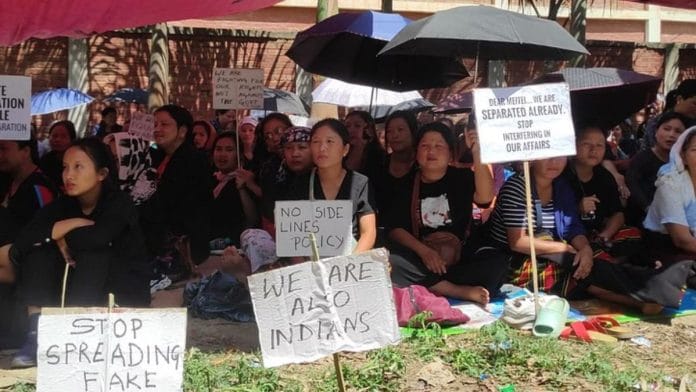On 20 July, Prime Minister Narendra Modi broke his 77-day silence on the violence in Manipur. In the face of mounting condemnation by the opposition of the BJP’s failure – both at the state and the central level– to decisively stop the unrest in Manipur, he finally expressed his shock and anger at the horrific incident where dozens of Meitei men publicly paraded two disrobed Kuki women. But in his 36-second-long speech, he also slipped in a reference to crimes against women in two other states—Rajasthan and Chhattisgarh, both Congress-ruled.
Two days later, BJP leader Amit Malviya dragged another non-BJP-ruled state, West Bengal, into the discourse after a video emerged of some angry women disrobing two tribal women in Malda. Five people were arrested in the case. It is a different level of irony that the two victims in the case were also arrested but they were later released on bail. However, comparing this incident – ghastly and condemnable as it is—to the Manipur horror is surely whataboutery hitting rock bottom.
Age-old tactic
The strategy of deflecting blame by criticising the critic has been around forever. During the Cold War, the then USSR would counter accusations of human rights violations and other abuses made by the US by pointing out racial segregation in the US. In 1970, the strategy of false moral equivalence was used in the internal conflict in Northern Ireland. But there is no debate that the use of this strategy has soared worldwide in the last decade. Especially, in India. And, in the last week, it has “Everest-ed” in New Delhi.
How can one speak of Manipur and Malda in the same breath as some leaders of the BJP have been doing? Malda, where the two women were disrobed and thrashed because they were suspected to have picked pockets or purses at a busy village marketplace, was a crime committed essentially by angry individuals who had allegedly been robbed. The state of West Bengal has seen much worse incidents. I remember in 2010 a tribal girl in Birbhum was paraded naked because she had eloped with a non-tribal. But those were crimes by individuals or a group of people acting in their own capacity and in their personal interest.
In Manipur, the crime of disrobing, parading, and assaulting the two Kuki women, with at least one of them being gangraped, was a result of ethnic hate that the state had done little to quell. It was the result of a failure of the State. If some accounts are to be believed, of the police standing as mute spectators—or worse, the police handing over the women to the Meitei mob—then the State could even be accused of connivance.
Two other examples of State crime that perhaps come close to Manipur are the Gujarat riots of 2002 and the anti-Sikh riots of 1984 in New Delhi. In both, analysts say the State could either be viewed as an active participant or an entity that failed to stop the violence when it could have. Those with long memories say it was the same story at Nellie, Assam, in 1983 when 1600 to 2000 Muslim immigrants of East Bengal origin were massacred in a span of six hours. Younger memories point to Hathras and the cremation of an alleged gangrape victim by the police without the permission of her family, as per claims and counterclaims.
Also read: Internet shutdown didn’t protect Manipur. Govt used it to hide its shame
Admission of failure
By trying to compare the crime of the magnitude of Manipur to Malda, the misfortune of Malda is mocked and the tragedy of Manipur is exacerbated.
Why resort to this tactic? Whataboutery is actually an admission of failure and guilt like four of your fingers pointing inward at you when you point a finger of blame at somebody else.
It’s not as if the BJP has a monopoly on this strategy. Every political party has resorted to it at some time or the other, the technique of responding to an accusation, by making a counter-accusation or raising a different issue. But using this technique is a sign that you are losing an argument. That is surely not a signal any political party would want to send out months ahead of the general elections of 2024.
The author is a senior journalist based in Kolkata. She tweets @Monideepa62. Views are personal.
(Edited by Ratan Priya)






